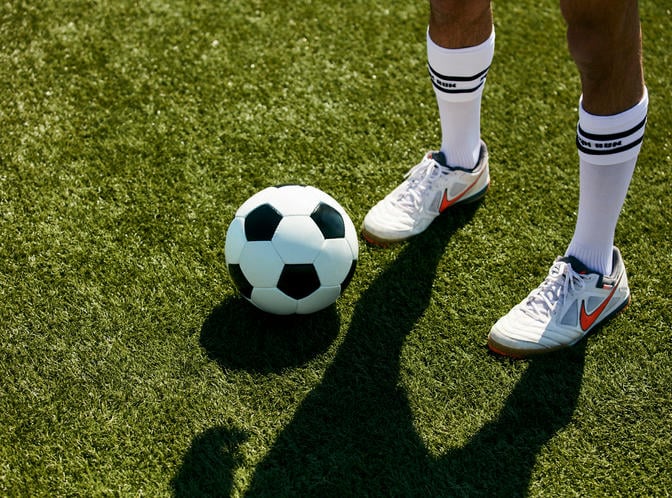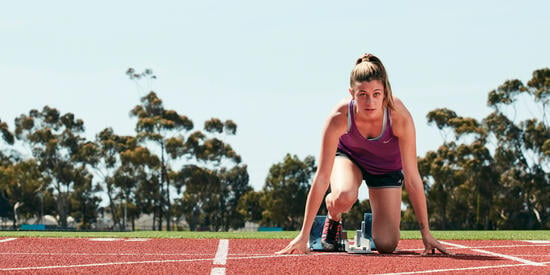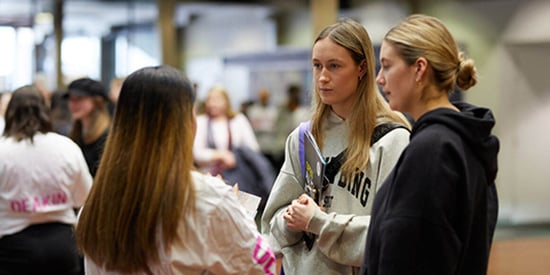Key facts
Current Deakin Students
To access your official course details for the year you started your degree, please visit the handbook
Course overview
Turn your passion for sport into a rewarding career with Deakin's Bachelor of Sport Development. Ranked 7th in the world for sport-related subjects*, Deakin has world-class academics, facilities and industry connections to teach you the skills to use sport to drive positive change in the community.
You will learn to build the capacity of community sport organisations, clubs, leagues and associations and learn practical methods to guide sport organisations in strategy, governance, policy and risk management.
State-of-the-art sports precincts combined with a long list of sports partners - including the Deakin Melbourne Boomers, Netball Victoria and the Melbourne Vixens, Geelong Football Club, and Cricket Australia - mean you will be studying in elite environments, both on and off campus. With over 100 hours of work placement, you can work alongside established professionals in sport while building industry experience that will prepare you for your future career.
Want to make a difference to the health and wellbeing of individuals and communities through sport?
In the Bachelor of Sport Development, you will learn to develop and manage coaches, officials and other volunteers. We will teach you how to design funding applications and implement the programming that underpins community sport development covering topics such as inclusion, culture and diversity, integrity and safeguarding.
If sport has had a positive impact on your life, you are well placed to enter a career that focuses on ensuring current and future generations experience the benefits of sport. You will develop sport programs that improve health and social outcomes, and harness sport's capacity to bring people together in times of need. In particular, you will learn how sport can be used as a powerful tool to rebuild and re-energise communities that have suffered inequality or social challenges.
The study areas you will cover are relevant to the needs of the industry and give you a deep understanding of:
- sport systems
- programs and pathways
- contemporary health and community development approaches
- the organisation, management and governance of sport organisations.
Looking for a career that takes you out of the stands and onto the field? The course also trains you in skills related to athlete development and on-field performance. Get practical experience developing coaching programs and sport development philosophies and discover what it takes to prepare individuals and teams for game day.
Your studies will be enriched with real-world experience, and you'll have plenty of opportunities to apply your skills outside of the classroom.
* QS World University Rankings
Read MoreCourse information
- Award granted
- Bachelor of Sport Development
- Year
2024 course information
- Deakin code
- M320
- CRICOS code?
- 058665B Burwood (Melbourne)
- Australian Qualifications Framework (AQF) recognition
The award conferred upon completion is recognised in the Australian Qualifications Framework at Level 7.
Course structure
To complete the Bachelor of Sport Development, students must attain a total of 22 core units (11 units from Business and Law and 11 units from Health), 2 elective units (1 unit from Business and Law and 1 unit from Health), plus completion of the 0-credit point module, DAI001 Academic Integrity Module and unit, HSE010 Exercise and Sport Laboratory Safety. Most units (think of units as 'subjects') are equal to 1 credit point. Most students choose to study 4 units per trimester, and usually undertake 2 trimesters each year.
To complete the course you must include:-
- completion of DAI001 Academic Integrity Module (0-credit-point compulsory module)
- completion of HSE010 Exercise and Sport Laboratory Safety (0-credit-point compulsory unit)
- 3 credit points of Foundation for Sport Development units
- 6 credit points of Sport Organisation Development units
- 5 credit points of Coaching units
- 6 credit points of Community Development units
- 2 credit points of Practicum units
- 2 credit points of elective units (one from Business and Law and one from Health)
Core Units
Foundation for Sport Development units:Sport Organisation Development units:
Coaching units:
Community Development units:
Practicum units:
Compulsory 0-credit point units
To be completed in the first trimester of study:
Elective units
Completion of 2 credit points:
one credit point from Business and Law
one credit point from Health
Intakes by location
The availability of a course varies across locations and intakes. This means that a course offered in Trimester 1 may not be offered in the same location for Trimester 2 or 3. Check each intake for up-to-date information on when and where you can commence your studies.
Deakin splits the academic year into three terms, known as trimesters. Most students usually undertake two trimesters each year (March-June, July-November).
Additional course information
Course duration
Course duration may be affected by delays in completing course requirements, such as accessing or completing work placements.
Mandatory student checks
Units which contain work integrated learning, a community placement or interaction with the community may require a police check, working with children check or other check. These requirements will be detailed in unit guides upon enrolment.
Workload
As a student in the Faculty of Business and Law, you can expect to participate in a range of teaching activities each week. This could include classes, seminars, practicals and online interaction. You can refer to the individual unit details in the course structure for more information. You will also need to study and complete assessment tasks in your own time.
Participation requirements
Units in this course may have participation requirements that include compulsory placements, work-based training, community-based learning or collaborative research training arrangements.
Placement can occur at any time, including during standard holiday breaks. Learn about key dates at Deakin.Reasonable adjustments to participation and other course requirements will be made for students with a disability. More information available at Disability support services.
Work experience
This course provides students the opportunity to complete one or more work integrated learning units.
More Information: WIL Programs
International Students:
This course includes Work Integrated Learning (WIL) formally registered as part of the course on the CRICOS register. The total work integrated learning hours will differ depending on the WIL unit you choose. For more information about WIL hours, please check the unit information in the handbook or the unit guide.
For information about how WIL units may impact student visa holder work rights, please visit https://immi.homeaffairs.gov.au. See Schedule 8 (8102)Visa Conditions.
Entry requirements
Selection is based on a holistic consideration of your academic merit, work experience, likelihood of success, availability of places, participation requirements, regulatory requirements, and individual circumstances. You will need to meet the minimum academic and English language proficiency requirements to be considered for selection, but this does not guarantee admission.
Academic requirements
Current or recent secondary education
If you're currently studying Year 12, or completed Year 12 in the last two years, you will need to meet all the following criteria to be considered for admission to this degree:
Year 12 prerequisite subjects
- Units 3 and 4: a study score of at least 25 in English EAL (English as an Additional Language) or at least 20 in English other than EAL
ATAR
- Senior Secondary Certificate of Education with an unadjusted ATAR of at least 50 or equivalent
Higher education
If you have undertaken higher education studies after secondary schooling, you will need to meet all the following criteria to be considered for admission to this degree:
- successful completion of at least two credit points in an equivalent (AQF Level 7) bachelor degree.
Vocational education
If you have undertaken any Vocational Education and Training (VET) study after secondary school, you will need to meet at least one of following criteria to be considered for admission to this degree:
- completion of a certificate IV or higher in a related discipline
- completion of a diploma or higher in any discipline
- at least 50% completion of a diploma or higher in a related discipline
Work and life experience
If you finished Year 12 more than three years ago, or did not finish Year 12, and haven’t undertaken any further study, you may be considered for admission to this degree based on your work, volunteer and/or life experience.
Submit a cover letter outlining your motivation to study, previous education and employment history, and how this course can assist your career aspirations or progression. Think of it as a job application cover letter – it should be relevant and demonstrate your commitment and interest in this course or study area.
English language proficiency requirements
To meet the English language proficiency requirements of this course, you will need to demonstrate at least one of the following:
- Victorian Certificate of Education (VCE) English Units 3 and 4: Study score of 25 in English as an Additional Language (EAL) or 20 in any other English
- IELTS overall score of 6.0 (with no band score less than 6.0) or equivalent
- other evidence of English language proficiency (learn more about other ways to satisfy the requirements)
Admissions information
Learn more about Deakin courses and how we compare to other universities when it comes to the quality of our teaching and learning. We're also committed to admissions transparency. Read about our first intake of 2023 students (PDF, 354KB) – their average ATARs, whether they had any previous higher education experience and more.
Not sure if you can get into Deakin? Discover the different entry pathways we offer and study options available to you, no matter your ATAR or education history.
Scholarship options
A Deakin scholarship could help you pay for your course fees, living costs and study materials. If you've got something special to offer Deakin - or maybe you just need a bit of extra support - we've got a scholarship opportunity for you. Search or browse through our scholarships
Apply now
International students who are currently completing an Australian Year 12 in Australia or overseas should apply through the Victorian Tertiary Admissions Centre (VTAC), as well as directly to Deakin through StudyLink Connect – Deakin University's International Student Application Service. For information on the application process and closing dates, see the How to apply web page.
All other international students apply directly to the University through StudyLink Connect - Deakin University's International Student Application Service. For information on the application process and closing dates, see the How to apply web page.
Fill out the application form and submit to a Deakin International office or take your application form to a Deakin representative for assistance
For information on the application process and closing dates, see the How to apply webpage.
If you’re still having problems, please contact Deakin International for assistance.
Careers
Career outcomes
This course will prepare you for roles in coaching, the leisure industry, and sports science and in the field of community sports development.
Career opportunities include:
- Community sports development officer
- Community engagement officer
- Club development officer
- Sport and recreation officer/manager
- Sport program development officer
- Participation coordinator/manager
- Sports coach
- Sport development officer
- Sport governance official
- Sport policy officer.
Professional recognition
Deakin Business School holds both AACSB and EQUIS accreditations. These prestigious accreditations are awarded to business schools that meet strict standards of quality, academic and professional excellence, and demonstrate a commitment to ongoing improvement and innovation in their courses, ensuring our graduates are employable worldwide.
Course learning outcomes
Deakin's graduate learning outcomes describe the knowledge and capabilities graduates can demonstrate at the completion of their course. These outcomes mean that regardless of the Deakin course you undertake, you can rest assured your degree will teach you the skills and professional attributes that employers value. They'll set you up to learn and work effectively in the future.
| Graduate Learning Outcome | Course Learning Outcome |
| Discipline specific knowledge and capabilities | Demonstrate core knowledge of the distinction between the development of and through sport by analysis and application of theory in sport development, coaching, and allied disciplines in order to provide effective management in the development and delivery of sport |
| Communication | Develop written, oral and visual communication skills around complex concepts for diverse stakeholders with interests in sport development and coaching including organisations in government and corporate sectors, and those involved in delivery of sport at community through to elite settings |
| Digital literacy | Select and use a range of digital technologies in appropriate ways to manage and disseminate relevant information to stakeholders engaged in sport development and coaching |
| Critical thinking | Demonstrate the ability to exercise reasoned judgement and reflection in relation to managing sport development and coaching |
| Problem solving | Identify and address issues, formulate solutions related to the development and design of sport policy, systems, pathways and practices to implement efficient strategic and operational outcomes for enhancing the development of and through sport |
| Self management | Demonstrate skills to work independently and take responsibility for continuing professional development |
| Teamwork | Constructively engage in teams to contribute to collaborative outcomes and be able to take on roles towards demonstration of sound management of sport development and coaching |
| Global citizenship | Engage as a professional in the sport industry with the skills that are applicable to a variety of contexts (sport science, coaching, sport management) and issues (global, social, ethical, cultural) in the development of and through sport |




